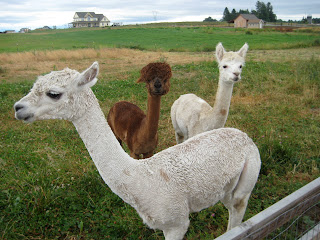
Yesterday, a local goat breeder lady and her 3 year old daughter came over to visit. We had been carrying on an e-mail conversation about my renting her Nubian buck for my goats, and when she discovered the Iris' pedigree she was very exited. Apparently, Iris is a very fancy schmancy goat from a well respected breeder. Her Sire, Polaris, is a famous (locally) buck whose semen sells for $100 a pop. When she found out that I was totally clueless about how to register Iris and her babies and didn't know a thing about goat conformation (I just make cheese, hey), she offered to come over and teach me a thing or two and have our girls meet and play.
She was quite impressed with the twins, and said it's a shame I had the boy neutered. He's apparently got great conformation, and he has the same coloration as Polaris. Oh well. Also, the twins are huge, she said, and they both have little pouches on their necks called milk goiters, which means they are drinking too much milk and getting too fat. At 14 weeks old, they could have been weaned a few weeks ago. They don't need the milk anymore, and I'm not getting it! I wondered how much milk Iris was actually producing, if she was overfeeding twin babies and still giving me a couple of pints a day.
So last night, for the first time, I separated them. I put the babies in the milking barn and locked the door. Such bawling! Such bleating and screaming! Iris trotted all around the barn yelling for her kids until I got tired of watching the spectacle and went inside. This morning when I went out to milk, Iris was peacefully grazing in the field, but the babies were hollering blue murder. I carefully let Iris in and pushed the twins outside before they could attack their mom, and I milked a good half gallon from Iris. When I let her out, the twins tried to nurse, but there wasn't anything there! Iris hates to have her teats touched when she has no milk, so she kicked the babies away from her. Maybe now she'll wean them. If so, I'll have an evening milking as well from her. If not, it doesn't matter, since I'm more than making up the difference from the increase in the morning's milk.
In fact, I have a serious milk surplus. Right now, in the fridge, I have a pound of chevre and a gallon and a half of milk. I also have a quart of yogurt and yesterday I canned six cups of cajeta. We can't eat more cheese, and I can't sell cheese or milk. I could keep canning cajeta, but what am I going to do with 100 cups of caramel? Add it to the rhubarb sauce in christmas baskets, I guess.
Cajeta:
1 gallon fresh goats milk
3 cups sugar
1 teaspoon baking soda
1/2 stick butter (4 tablespoons)
Add sugar to milk in a large kettle. Heat and stir to dissolve sugar. When milk is simmering and sugar is dissolved, remove from heat and add the baking soda, dissolved in an ounce or so of water. Milk will begin to foam up. Replace pot on heat and stir constantly with a wooden spoon until foam subsides (it won't subside completely) and milk returns to a fast simmer. Keep on the simmer for about two hours, stirring fairly frequently, until caramel sauce is a rich light brown and thickly coats a spoon. Stir in the butter, one tablespoon at a time, until fully incorporated.
Ladle into sterilized jars, top with sterilized lids and rings, and process in a boiling water bath for 10 minutes. Lids will seal as the jars cool.

 It's been raining today, good for my garden, but unfortunate for the alpacas, who are too timid to enter the barn. They look very wet and very cold, having just been sheared, but I can't either entice them or chase them into the barn, where the scary scary goats are. Alpacas are incredibly timid. It's like having a herd of wild antelope out there. I hope they go into the barn at night, because it's going to be quite cold tonight.
It's been raining today, good for my garden, but unfortunate for the alpacas, who are too timid to enter the barn. They look very wet and very cold, having just been sheared, but I can't either entice them or chase them into the barn, where the scary scary goats are. Alpacas are incredibly timid. It's like having a herd of wild antelope out there. I hope they go into the barn at night, because it's going to be quite cold tonight. 





























